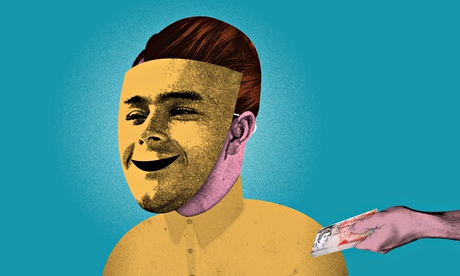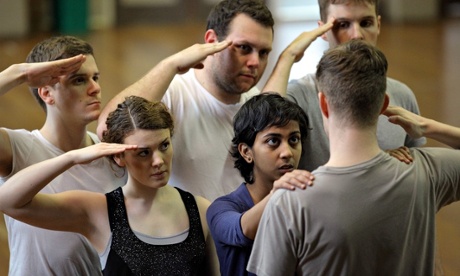Creative types have the confidence to take risks. And they understand that money isn’t everything

Anthony Ward Thomas, of Ward Thomas Removals, has a problem that he shares with the public. After a life spent turning a man with a van into a multimillion-pound firm, he finds his children are not interested in taking over. “They have different interests,” he says. He is sad, but agrees “there should be no divine right that they get the business”. They should make their own way in the world. This they are doing. His daughters are country and western singers and his son is an actor. I doubt if they are as rich.
When penal supertaxes were ended in the 1980s, the surplus spending power was expected to go on cars, yachts and houses. Much of it did. But a new form of supertax emerged, no less insistent than the last. It was called children. And not just any children, who might look after their parents in old age, but ones seeking a life of fashionable but impecunious “creativity”.
Statistics say the chief cost of child-rearing occurs in the teens. To get an offspring housed, clothed, fed and educated to the age of 21 takes an average of £225,000, or half a million if privately educated. This has more than doubled over the past decade. But ask most parents, and the expense does not stop at 21. It continues through further education, travel, internship, ongoing board and lodging, even early marriage.
Thousands the world over are returning to live at home after university. Australians have “boomerang” children, Italians bamboccioni (big babies), the Japanese parasaito shinguru (parasite singles) and the Germans “hotel mama”. To the youth psychologist Haim Omer, this “entitled dependency” has become “the new hedonism … an ideology at the parents’ expense, nothing less than a pandemic”. Behind this phenomenon stands the famous “bank of mum and dad”, notably in the matter of housing: its motto is “pay up or we stay”. In Britain this bespoke baby bank reportedly hands out a staggering £27bn annually. The loans have nothing to do with investment. The bank would go swiftly bust if they did. Money is spent, above all, on property. A trivial £600m is reckoned to go on business ventures. The bank is too proud to fail. The Ward Thomas branch of this bank is more specific. I am not privy to the family’s circumstances, but if the bank is like many I know, it existed to fund careers in “something creative”, often what the parents once called a hobby but their children consider a talent in need of full occupational rein. This bank of mum and dad becomes a private arts council, far outstripping the resources available to the real one.
A cultural economist might welcome this. It forces down pay and costs in the arts, making it cheaper to run literary festivals, music venues, provincial rep, galleries and publishing. Children are far more expert at extracting “grants” from parents than is the Treasury; HMRC has no clout to compare with “Edinburgh could be our big break, Dad”.
But the phenomenon has consequences. It biases “subsidy”, and the jobs to which they give access, towards the children of the rich. It also seriously distorts higher education, with a booming demand for courses in drama, dance, fine art, music, film, photography, design and creative writing.
Britain now has 160,000 undergraduate and postgraduate students in “creative arts and design”, with more than 20,000 in drama alone. This is more than in the whole of engineering or in maths and computing combined.
This academic bias is far beyond what the market for such skills can sustain. Just 28% of graduates in performing arts find jobs in the arts or media, while almost the same proportion find their way into retail and catering. Britain’s bursting drama schools are training a better class of waiter.
Does this matter? The lethargy afflicting Japan’s once-tiger economy over the past decade is attributed to precisely this career demotivation of the post-salaryman generation. Young Japanese have been able to afford to turn away from their parents’ grinding labour and its karoshi, or death from overwork. A similar collapse may one day afflict Chinese entrepreneurialism. Even the continued vitality of the US and Germany is attributed not to natives but to migrant talent drawn from less favoured countries.

Europe is in the economic doldrums. It may produce the best opera singers and write the best novels, but its cars and computers are rubbish. Its bankers can hedge markets and its tour operators can market hedges, but the funds come from Asian enterprise. Either it will discourage its young from dancing, film-making and creative writing and galvanise it to risk-taking innovation, or it will slither into becoming a gigantic Bournemouth, living off the dwindling fat of its past.
So says the economist. Or should we put more faith in the dynamic of a humanistic education? Graduates in the performing arts are actually high achievers in finding work outside their skill group, probably through enhanced confidence and articulacy. They take chances and do not regard money as everything. They seem better equipped to use their imagination and challenge conventional wisdom.
The pop science bestseller Sapiens, by Yuval Noah Harari, suggests that humans “are now beginning to break the laws of natural selection, replacing them with the laws of intelligent design”. Human advance through natural selection has reached its limit. Strides forward will now be technological rather than biological.
For Harari the question for our species is not “what do we want to become?”, but the far harder question, “what do we want to want?”. Who makes the choices? The answer will not lie in the brave new world of cyborgs and robots. It can only lie in what are rightly called the humanities, the history and imagination of human beings. Alexander Pope was always right: “The proper study of mankind is man.”
Most British adults now believe their offspring will be poorer than themselves. Yet millions indulge their children in careers they know will yield neither financial reward nor national advantage. I am not convinced the world they are creating will really be worse off for that. There is plenty for the robots to do, like running removal firms.

No comments:
Post a Comment